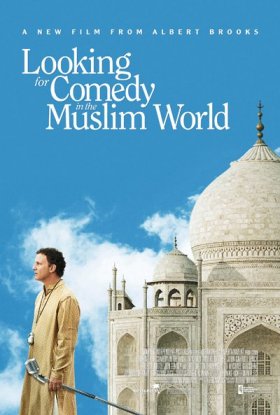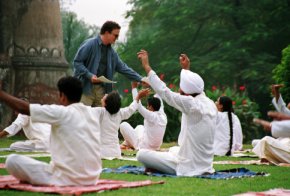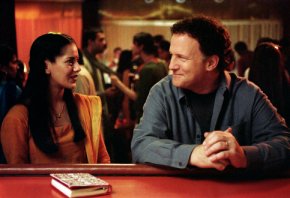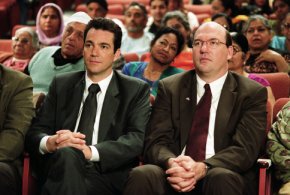As usual, writer/director/star
Brooks starts with a simple and almost painfully true premise:
the government just does not understand the Muslim world.
After trying the usual approaches of spying and warfare,
a commission has been formed to find out what makes Muslims
laugh. So naturally, after being turned down by several
comedians, they turn to Albert Brooks.
He must write
a 500-page report on what makes Muslims laugh. To gather
his information, he will be sent into India and Pakistan
for four weeks. Wisely, Brooks asks the question that many
audience members would: isn't India mostly Hindu? Proof
again that most of us don't really know that much
about the Muslim world.
Before
the movie gets under way, we've got layers of irony. Brooks
well knows that as a comedian, he doesn't appeal to everyone's
taste, though he has flirted with popularity. Later on,
his government handler (John Carroll Lynch) advises him
to mention Finding Nemo
as he gets desperate to connect with passers-by.
The problem
for Albert Brooks in this film is that he's playing Albert
Brooks, not a character that acts a lot like Albert Brooks.
Obviously, it's fictionalized, with a blonde wife (Amy Ryan)
and happy daughter (Emma Lockhart) that may be like
his actual family but aren't.
But playing
himself takes away the distance that keys audiences in to
his nervous prickly persona. He spends much of the first
act protesting that nobody really gets him, including his
other government handler, played by Jon Tenney, who criticizes
one of Brooks' few mainstream successes, Lost in America.
When Brooks keeps trying to build himself up, it's obviously
a lost cause.
So when he turns
the second act over to reviving his long-retired stand-up
act, it's a risky move. India doesn't have comedy clubs,
and Brooks has no place to establish if India even has a
stand-up tradition. His act, which really is his
old act from the seventies, relies heavily on satirizing
stand-up.
Of
course nobody in the movie gets it. The problem is that
people watching the movie won't get it. Brooks plays a blustering
failure, so when that guy bombs in a stand-up act, it must
be because he sucks, not because the jokes are sailing high
over everyone's heads. The ventriloquist act worked great
on The Ed Sullivan Show, because audiences had
probably seen his target just the week before. The improv
bit skewers arrogant improvisers perfectly, but Brooks comes
off too much like an arrogant improviser himself.
That's not to
say Looking For Comedy in the Muslim World isn't
funny. Though it has few laugh-out-loud moments, it provides
a steady stream of chuckles. Brooks may be the only man
in cinema history to actually disprove that explaining a
joke ruins it, as his teaching his Indian assistant Maya
(Sheetal Sheth) about sarcasm gets funnier and funnier with
each beat.
He has also
stumbled across something more serious that he doesn't quite
develop as a writer. It may not be that our cultures are
different on a personal level; it all comes down to paranoia
and mistrust.
Early on, as
Brooks tries to survey New Delhians about comedy, a business
man tells him, "I do not want to talk to anybody from the
United States government." Because his handlers do not know
how to effect an actual innocuous diplomatic fact-finding
mission, they treat it like espionage, always delivering
something substandard and at one point resorting to smuggling
Brooks over the border into Pakistan for a four-hour meeting
with budding Muslim comics.
Of course, this
creates international tension that Brooks the character
remains blissfully in the dark about. Brooks the writer
and director, however, has buried sharp criticism underneath
his character's fumbling toward understanding.
Yet it never
quite coalesces. Clearly, Tenney's slick State Department
attaché is supposed to say something about the arrogant
seduction of America, as he's referred to as "quite the
ladies' man," a trait dropped after only one punchline.
His counterpart Lynch may or not be truly well-meaning;
the script plays it too opaque.
On the other
side, Maya's boyfriend Majeed (Homie Doroodian) is pointedly
from Iran. Both he and Maya clearly have a fascination for
American culture, but it never really adds any nuance, just
throwaway jokes. At one point, Majeed seems to know quite
a lot about The Tonight Show from satellite broadcasts,
but to develop that would kill Brooks' premise that India
doesn't know anything about comedy.
Perhaps
when dealing with the Muslim world, the best thing we could
do is admit we don't know anything, then try to move on
from there. When dealing with this movie, admit that it's
not nearly as deep and probing as it wants to be, but hope
that Brooks will keep on trying. As a filmmaker, he is as
smart as he thinks he is, but he just has trouble connecting
in a culture that has gone mostly pop.









